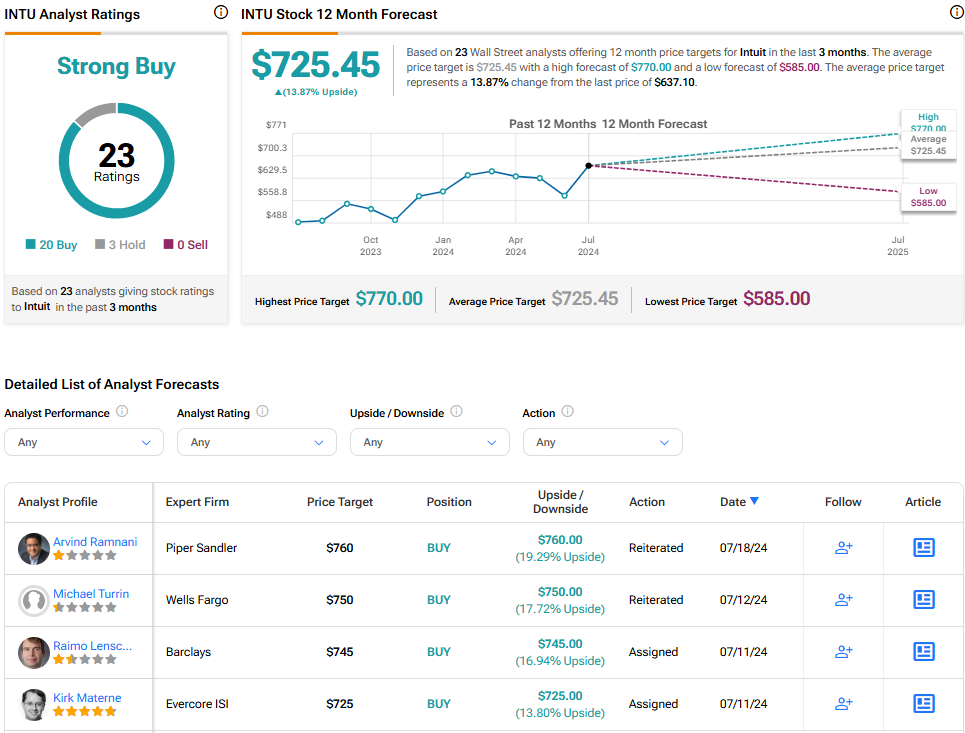Layoffs are never pretty, but for accounting software giant Intuit (INTU), the long-term benefits from the job cuts could make the overall business much more attractive. By terminating underperforming workers and redirecting the long-term savings toward developing its artificial intelligence, the company will be on the road to potentially greater efficiency and productivity. Therefore, I am bullish on INTU stock despite the not-so-pleasant news.
Elevate Your Investing Strategy:
- Take advantage of TipRanks Premium at 50% off! Unlock powerful investing tools, advanced data, and expert analyst insights to help you invest with confidence.
Pink Slips Make the Financials of INTU Stock More Attractive
Earlier this month, Intuit generated headlines for eliminating about 10% of its headcount. That’s about 1,800 jobs. According to TipRanks contributor Steve Anderson, the distribution of pink slips represented a bid to raise cash for integrating AI. “Intuit has been working toward AI-driven accounting and tax prep solutions for some time now, and this latest move is just the next step,” wrote Anderson.
An important caveat to the story is that INTU stock did not receive a bump in its share price. Many times, job cuts boost equity valuations due to the underlying cost savings. However, Anderson noted, “Intuit plans to hire 1,800 people to engage in engineering and product development, as well as ‘customer-facing roles,’ which will limit the cost savings.”
Should stakeholders and prospective investors of INTU stock be worried? In my opinion, no. Because a good portion of the new hires will involve development units, Intuit can still extract long-term savings. Think of it this way: over several years, it’s better to spend money on generative AI than it is to spend that same money on underperforming employees.
At face value, that’s one of the main reasons why Intuit initiated the cuts. Some folks just weren’t meeting the company’s standards. It happens. Moving forward, the software firm can focus more on generative AI. Once the programs are up and running, they would presumably not need the expenditures that human workers require. This dynamic should lead to cost savings and improved efficiencies in the long run.
And that’s what makes INTU stock so intriguing for patient investors. Right now, investors will look at Intuit and label it as overvalued. Shares trade hands for 58.8x trailing-year earnings and 11.4x trailing-year sales. In contrast, the underlying Application Software sector runs an average earnings multiple of 44x and an average sales multiple of 4.1x.
However, it’s important to consider that analysts are very bullish on INTU stock. By the end of the current fiscal year, experts project that Intuit’s earnings per share may hit $16.82. If so, that would imply a growth rate of 16.8% over last year. On the top line, revenue could clock in at $16.18 billion, up 12.6% from 2023’s print of $14.37 billion.
Will these projected figures get INTU stock down to a point where it’s undervalued? To be blunt, not really. The forward earnings multiple would drop to around 38x. The sales multiple would decline modestly to 11x. However, AI in accounting should be a burgeoning field. Therefore, while INTU may carry a relatively rich premium, that might not stop it from moving higher.
Intuit on a Reliable Growth Trek
Part of the confidence undergirding Intuit stock is that the underlying accounting field follows mathematical logic. There are defined limitations in the discipline; that is, a debit must have a counterbalancing credit. Therefore, as an AI-related enterprise, Intuit is arguably less risky than many pure-play AI stocks.
Questions have started to arise about the practical benefits of digital intelligence. The concern is that the rewards from AI are nowhere near the costs. However, that argument might not apply to Intuit. Again, the company deals with a defined discipline: like chess, there are only so many acceptable moves you can make in accounting.
In other words, this limitation forces generative AI algorithms to focus, making them theoretically less likely to hallucinate. And even if it does hallucinate, logical functions baked into the programming can create guardrails (for instance, preventing the inputting of two credits to counterbalance one debit).
Interestingly, Mordor Intelligence believes that the broader AI market may expand at a compound annual growth rate (CAGR) of 31.22% from 2024 to 2029. However, the CAGR for the AI in the accounting market – also from the same source – is projected to hit 41.27% in the same period. That’s a pretty sizable gap.
Obviously, because AI in accounting is a smaller market, projections might be more volatile or less predictable. However, it’s also quite possible that because of the limitations of the accounting discipline, it’s much easier to develop sector-specific AI programming.
Thus, the projected growth in Intuit’s business is reasonable, if not a bit understated.
Is Intuit Stock a Buy, According to Analysts?
Turning to Wall Street, INTU stock has a Strong Buy consensus rating based on 20 Buys, three Holds, and zero Sell ratings. The average INTU stock price target is $725.45, implying 13.9% upside potential.

The Takeaway
Layoffs are ugly, and Intuit recently issued some, which appears to be problematic since the cost savings don’t appear to be readily evident. However, management will likely redirect resources toward developing generative AI protocols, and that’s attractive for the accounting discipline, which features rules and limitations. Such factors limit how “creative” AI can be, making digital intelligence in the space a more credible endeavor. Therefore, the growth projections for INTU stock enjoy strong justification.
















